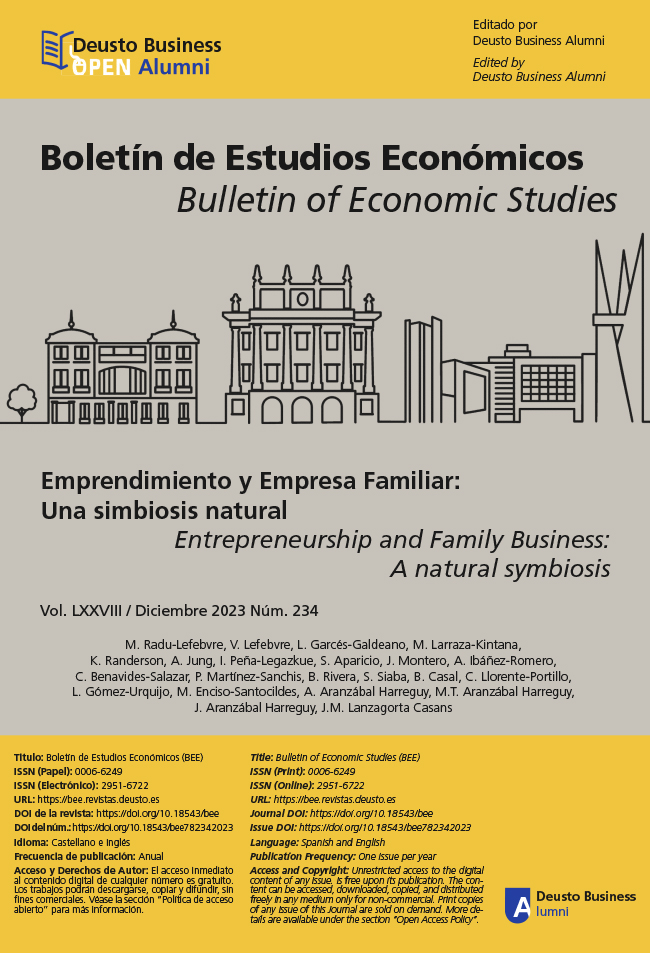I want to break free: Successor Emancipation in Family Business
Abstract
Family business successors live at the nexus of past, present and future, nourished and inspired by past legacies while also craving to build a brand-new future. The senior generation is generally the guardian of firm continuity in charge of preserving past achievements, whereas the next generation might dream about introducing change and innovation within the current landscape of the family firm. Yet these attempts too often trigger resistance and anxiety in the senior generation, who might respond with increasing control and suspicion to any tentative of challenging the status quo such as transforming current products, services, business models, or organizational structures. Successors operate at the intersection of these opposite forces of conservatism and reform, and one of their major issues is that they need to handle them effectively, that is without jeopardizing family relations and harmony nor losing themselves into the process. Unless they succeed in doing so, succession failure might follow. By combining two different streams of literature grounded in distinct disciplines, namely succession literature in family business and emancipation literature in entrepreneurship, we reveal successor emancipation as a novel explanation of why successions fail and offer some practical advice on how to handle these tensions in intra-family succession.
Received: 10 May 2023
Accepted: 28 Jun 2023
References
Bettinelli, C., Mismetti, M., De Massis, A., & Del Bosco, B. (2022). A review of conflict and cohesion in social relationships in family firms. Entrepreneurship Theory and Practice, 46(3), 539-577. https://doi.org/10.1177/10422587211000339
Campbell, N. D., Heriot, K. H., & Welsh, D. H. (2007). The black box: Unraveling family business succession. New England Journal of Entrepreneurship, 10(2), 9-14. https://doi.org/10.1108/neje-10-02-2007-b001
Daspit, J. J., Holt, D. T., Chrisman, J. J., & Long, R. G. (2016). Examining family firm succession from a social exchange perspective: A multiphase, multistakeholder review. Family Business Review, 29(1), 44-64. https://doi.org/10.1177/0894486515599688
De Massis, A., Chua, J. H., & Chrisman, J. J. (2008). Factors preventing intra-family succession. Family business review, 21(2), 183-199. https://doi.org/10.1111/j.1741-6248.2008.00118.x
Foucault, M. (1980). Power/knowledge: Selected Interviews and Other Writings, 1972-1977. New York: Pantheon Books.
Jaskiewicz, P., Combs, J. G., & Rau, S. B. (2015). Entrepreneurial legacy: Toward a theory of how some family firms nurture transgenerational entrepreneurship. Journal of business venturing, 30(1), 29-49. https://doi.org/10.1016/j.jbusvent.2014.07.001
Lefebvre, V., Radu-Lefebvre, M., Gartner, W. B., & Clarke, J. (2021). Building multitemporal awareness and reflexivity in family business: A visual sensemaking exercise. Entrepreneurship Education and Pedagogy, 4(2), 194-203. https://doi.org/10.1177/2515127420921388
Lefebvre, V. (2021). Who Do You Think You Are? Who Do They Think You Are? The Golden Cage and the Silver Spoon. In M. R. Allen & W. B. Gartner (Eds.), Family Entrepreneurship (pp. 145–159). Springer. https://doi.org/10.1007/978-3-030-66846-4_11
McAdam, M., Brophy, M., & Harrison, R. T. (2021). Anointed or appointed? Father–daughter succession within the family business. International Small Business Journal, 39(6), 576-600. https://doi.org/10.1177/0266242620948349
Porfírio, J. A., Felício, J. A., & Carrilho, T. (2020). Family business succession: Analysis of the drivers of success based on entrepreneurship theory. Journal of Business Research, 115, 250-257. https://doi.org/10.1016/j.jbusres.2019.11.054
Radu-Lefebvre, M., Ronteau, S., Lefebvre, V., & McAdam, M. (2022). Entrepreneuring as emancipation in family business succession: a story of agony and ecstasy. Entrepreneurship and Regional Development, 34 (7-8), 582-602. https://doi.org/10.1080/08985626.2022.2075472
Radu-Lefebvre, M. (2021). The Successor Conundrum: A Moral Dilemma. In M. R. Allen & W. B. Gartner (Eds.), Family Entrepreneurship (pp. 173-182). Springer. https://doi.org/10.1007/978-3-030-66846-4_13
Radu-Lefebvre, M., Lefebvre, V., Clarke, J., Gartner, W. B. (2020). Entrepreneurial legacy: How narratives of the past, present and future affect entrepreneurship in business families. In A. Calabro (Ed.), A research agenda for family business. A way ahead for the field (pp. 73-86). Edward Elgar Publishing. https://doi.org/10.4337/9781788974073.00010
Radu-Lefebvre, M., & Randerson, K. (2020). Successfully navigating the paradox of control and autonomy in succession: The role of managing ambivalent emotions. International Small Business Journal, 38(3), 184-210. https://doi.org/10.1177/0266242619879078
Rindova, V., Barry, D., & Ketchen, D. J. (2009). Entrepreneuring as Emancipation. Academy of Management Review, 34(3), 477–491. https://doi.org/10.5465/amr.2009.40632647
Shepherd, D. A., & Zacharakis, A. (2000). Structuring family business succession: An analysis of the future leader’s decision making. Entrepreneurship Theory and Practice, 24(4), 25-39. https://doi.org/10.1177/104225870002400402
Schlömer-Laufen, N., & Rauch, A. (2022). Internal and external successions in family firms: a meta-analysis. Journal of Family Business Management, 12(1), 24-40. https://doi.org/10.1108/jfbm-04-2020-0025
Yezza, H., Chabaud, D., & Calabrò, A. (2021). Dynamics of conflicts in family firms: towards a non-linear approach to the succession process. Journal of Enterprising Culture, 29(02), 79-107. https://doi.org/10.1142/s0218495821500059
License:
Works published in this journal are available since 2021 under the Creative Commons Attribution-NonCommercial 4.0 International license - CC BY-NC 4.0. Content prior to 2021 is not covered by the journal's current Open Access policy.
Authors' Rights:
Authors retain copyright over their work published in the Bulletin of Economic Studies and grant the Bulletin of Economic Studies non-exclusive rights to exploit the work for layout, publication, and dissemination purposes. This license allows the Bulletin of Economic Studies to distribute, reproduce, and disseminate the work on its platform and through other media, subject to the conditions outlined in this notice.
Readers' Rights:
Readers may read, download, print, search, share (copy, redistribute, or link to full text), or adapt (remix, transform, and build upon the material) the content, provided that:
- The materials are not used for commercial purposes.
- The original work is properly cited, including the name of the author and the source.
- Any modifications made to the original content are clearly indicated.
Commercial use of the materials is prohibited without the express permission of the authors. For clarity, commercial use is defined as any activity intended for financial gain or involving direct commercial exchange.
Conditions of Use:
The use of content must not infringe the rights of others or be used in a way that could damage the reputation of the author or the Bulletin of Economic Studies.
Responsibility for Content:
Authors are responsible for the content of their papers and the Bulletin of Economic Studies is not responsible for the opinions therein expressed.
More Information:
Open Access, Licensing, and Copyright Policy


.jpg)
.jpg)
.jpg)








